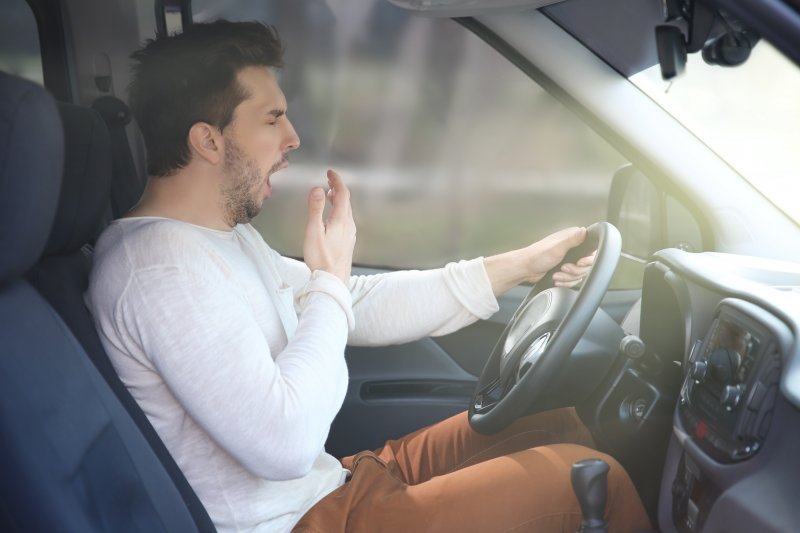
The health consequences of untreated obstructive sleep apnea (OSA), insomnia, restless leg syndrome, and other sleep disorders are vast. Heart conditions, diabetes, obesity, mental health concerns, and other short- and long-term associated conditions are directly linked to these disorders. And, the more research that’s done on sleep disorders, the more troubling the findings become.
While it’s well known that sleep disorders can become life-threatening, what’s not often discussed is that sleep disorders can fatally injure you in other, non-health related ways. In fact, there are three common sleep disorders that are directly linked to car crashes and other unintentional fatal injuries.
Here’s what we know about your increased chances of being in a motor vehicle accident, or an incident that results in a fatal injury, if you suffer from sleep apnea, insomnia, and/or shift work sleep disorder. While perhaps shocking at first glance, the below research is important to urge anyone with these conditions to seek, and stick with, treatment.
The Original Two Offenders
In 2014, the American Academy of Sleep Medicine (AASM) released a statement explaining that insomnia is a major contributor to fatal car crashes and other unintentional fatal injuries. Their findings revealed that individuals with severe insomnia were 2.8 times more likely to die from a fatal injury. Difficulty falling asleep was the symptom that was most closely tied to the various cases involving death related to insomnia.
Then in 2015, the AASM released another statement—and this time, sleep apnea was the focus. They found that patients with sleep apnea were nearly 2.5 times more likely to be the driver in a motor vehicle accident and that sleep apnea treatment reduced the risk of car crashes among those with sleep apnea by 70%.One year later, the AASM would go on to declare sleep apnea as a “hidden health crisis in the United States.” There are many reasons for this decision, including the fact that sleep apnea is behind millions of dollars going to work and auto accidents each year.
The Dangers of Shift Work Disorder
There is an additional sleep disorder that holds fatal consequences on the road: shift work disorder. Shift work disorder, which is caused by a person working long and/or irregular hours, can negatively affect circadian rhythms, causing disrupted sleep and excessive sleepiness while awake.
As of 2021, it’s been estimated that somewhere between 10-40% of shift workers in America suffer from shift work disorder. The two primary symptoms of the disorder are insomnia and excessive sleepiness, resulting in fatigue and a reduction in alertness.
According to the Sleep Foundation, shift work disorder can bring about serious health complications, including life-threatening medical conditions, alcohol and drug dependency, and unhealthy eating habits.
Additionally, a recently published study revealed that shift work disorder puts individuals at high risk (300% increase) for being in a car accident—and the risk only increases with age.
For comparison, both insomnia and sleep apnea increase the risk for car crashes by 30 percent.
Managing Shift Work Disorder
There are a few different ways that those who suffer from shift work disorder and those who typically work irregular hours can maximize the amount of sleep that they are receiving. After all, no matter what your schedule is like, it’s important to receive 7-9 hours of sleep each and every day:
- Minimize light exposure during the times you’ll be sleeping. Consider investing in blackout curtains not only for your bedroom, but for other parts of your house that you spend time in before you go to sleep.
- Increase light exposure right before your shift to wake up your body properly. This helps align your circadian rhythm by alerting your body that it’s time to be awake
- Follow your bedtime routine consistently and maintain a regular sleep schedule—even on weekends.
- At home, ask family and roommates to help create a quiet, dark, and peaceful setting during sleep hours. For example, make sure chores are done outside of sleep hours and ask that guests don’t visit during this time.
- Put a “Do Not Disturb” sign on the front door so that delivery people and neighbors will not knock or ring the doorbell.
A Long-Term Solution
If you or a loved one is dealing with sleep apnea, there is a more direct solution in addition to the daily tips outlined above: professional treatment. Under the care of a properly trained sleep medicine practitioner, sleep apnea symptoms can be significantly reduced. Plus, as noted earlier, proper treatment can significantly lower your risk of auto accidents and fatal injuries.
While there are multiple options, the most convenient and easy to use is oral appliance therapy. This treatment involves wearing a customized mouthguard to bed that enables you to breathe normally throughout the night and wake up feeling rested. To get one, the first step you need to take is to schedule a free consultation at Sleep Better Georgia with Dr. Jeff Rodgers. From there, it is just a matter of time before you’re able to start getting the rest you deserve.
